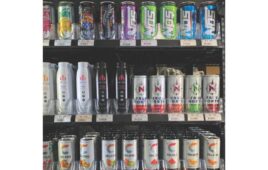More regulatory policies continue to exert a downward pressure on the resilient category.
By Howard Riell, Associate Editor
As fall turns into winter, convenience store operators continue to track the trends—both commercial and legislative—affecting the cigar category.
From concerns over deeming regulations to consumers’ ongoing desire for smaller, cheaper cigarillos, new flavors and limited-time promotional offers, the cigar category remains both dynamic and popular.
According to IRI, for the 52 weeks ending Sept. 4, 2016, cigar sales topped $2.7 billion, a 7.25% increase. The research firm Euromonitor International reported that volume sales of cigars and cigarillos declined 3% last year.
SMALLER VENUE
Smaller is clearly where the business is moving.
“In 2015, cigars continued to represent just over half (51%) of combined cigars and cigarillos volume sales, relatively stable since 2009, although markedly lower than in 2001 when cigars represented 62% of the total,” Euromonitor noted. “The historic decline in share has resulted in the remarkable pickup of flavored cigars and cigarillos, consumed by a younger, less affluent demographic.”
On May 5, 2016, the U.S. Food and Drug Administration (FDA) extended its authority to regulate cigars and cigarillos, deeming them to be subject to the Federal Food, Drug and Cosmetic Act (the FD&C Act), as amended by the Family Smoking Prevention and Tobacco Control Act of 2009. In doing so, cigars and cigarillos had to comply with FDA regulations by Aug. 8, 2016.
“The deeming regulations that extended the FDA’s regulatory authority over a number of tobacco products are set to have a notable impact on cigars and cigarillos in the years to come,” Euromonitor added, “making operating in the category subject to a number of additional existing tobacco regulations. These additions will include premarket approval for new products not substantially equivalent to products on the market before Feb. 15, 2007, and any future regulations the FDA creates.”
The general expansion of public smoking bans across the nation may have an adverse impact on the demand for cigars, as it becomes increasingly difficult and inconvenient to smoke them, Euromonitor concluded. “It is more likely that these bans, which are extending to outdoor public areas such as beaches and parks, will have a strongly negative impact on mass-market cigars.”
“Legislatively, what we are trying to do—not just for c-stores, because everybody is included in this—is trying to change the predicate date (current set at Feb. 15, 2007),” said Craig Williamson, Cigar Association of America president. “That is the biggest thing we are trying to do on the Hill this year. The new FDA regulations did not change the predicate date, so we have to look back, essentially, nine years as manufacturers.”
Unless Congress takes action to adopt the predicate date change and/or premium cigar exemption, then once the FDA’s proposed deeming regulations are
finalized, manufacturers will need to compile and submit either substantial equivalence applications or pre-market tobacco applications (PMTA) for many cigar and pipe tobacco products and virtually all e-cigarette and vapor products. In addition, premium cigars would also be subject to existing and future FDA tobacco regulations.
Thus, Williamson continued, the newer products that were not around nine years ago are going to have to go through the new application process. “They’ve only approved one, I think, of all the applications since 2009. So if we don’t get that changed we are going to have a lot of problems getting product to market.”
BACK TO BASICS
“Over the past few years we saw cigar companies often, and more then needed, introducing new flavors and new packaging that attracted smokers,” said Fouad Kashouty, the owner of Michafs Inc. in Lakewood, N.J., which operates seven Exxon and Shell-branded convenience stores, as well as a partner in premium cigar manufacturer Hiram & Solomon Cigars. While customers always want to try something new, the classic flavors like grape, cherry and vanilla remain the top sellers. “Most customers go back to the classical flavors that they are comfortable with.”
Kashouty, a 24-year c-store industry veteran, said that while Michafs’ leading brands remain White Owl, Backwoods, Black & Mild and Swisher Sweets, sales of unflavored premium hand-made cigars, though smaller, are growing rapidly.
He added that he has seen an influx of special promotions and limited-time offers.
“We have seen retailers keeping larger-than-usual inventories in order to keep customers coming back for more, which usually results in adding more sales for other categories in the c-stores,” Kashouty said.
Michafs sees two types of cigars selling well at convenience stores. The first is flavored, small machine-made. “Under this category the demographic did not change much, with a slight increase in a younger generation of smokers that are trying to sway away from cigarettes.”
The second is premium hand-made cigars, which he sees appealing to younger, less-affluent consumers. Women account for almost 25% of cigar smokers in lounges, he added. “But we rarely see women buying them at c-stores.”
But for convenience store retailers without access to the corridors of power of Washington, D.C., and local state houses, it’s the business of retailing that remains center stage.
“Mostly what we’re selling are cigarillos,” said Larry Gilbert, director of operations for Spivey Enterprises Inc. in Charlotte, N.C., which owns and operates seven Quik Shoppe Food Store locations. “It sort of changed the whole category for us. Some of our customers switched over to White Owl, which is also a Swedish Match brand.”
Gilbert said that promotional deals help but are not a primary driver of sales in his locations. “We do a little bit of promotion every now and then, just regular deals with the pre-priced stuff. I like to redo my category about every 90 days simply because if they’ve got new product coming out we want to cut out the slower-moving items to make room for it.” Quik Shoppe stores merchandise cigars on traditional racks that measure three feet across and six shelves high.
Gilbert said that he and his colleagues are not overly concerned with tobacco legislation as it exists now, but look with some hesitation at what might be coming in 2017. “It is what it is. I think the legislation probably is about where it needs to be. If they bump it up to where the minimum age is 21 then it’s going to affect the business quite a bit, and that could bite into the category pretty bad.”
Gilbert recommended that convenience store operators stick to the basics—in the case of cigars, simple visual marketing and trends analysis. “I think the best thing to do is to keep them out where people can see them. And make sure you keep up with what’s going on in the marketplace as far as which brands are popular and which ones people are wanting.”
The Cigar Association’s Williamson urged c-store operators to contact their congressmen and senators.
“Tell them that you stand behind the Cigar Association in trying to change the predicate date,” Williamson said. “All it is is a fairness issue. They should say they want cigars treated just like cigarettes. In 2009 they got a two-year look-back period, not a nine-year look-back period, and that’s what we should have been granted. That is really the most important thing they can do as c-store owners. Call them and say, ‘Look, why are they being treated unfairly?’”




